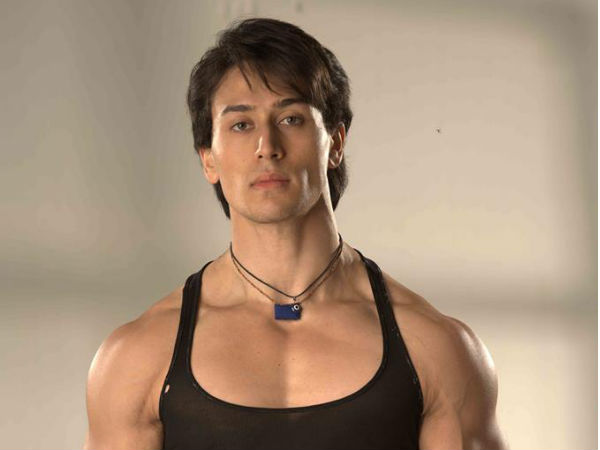In the eighties, it was enough for a hero to have intense eyes. If the wiry Jackie Shroff (who once admitted to have mixed Sunil Dutt’s jaunty walk with Dev Anand’s tenderness to become a hero) squinted at the camera like someone was stripping band-aid off a wound, we all winced in pain too. The connect was instant because it came wrapped in a story, a simple catch-tune and a hero who looked like he had been through a lot. Now of course, the eyes can wait and so can the connection, because the camera must linger first not on the soul but on a package of rippling muscles.
In the nineties, it was enough when Salman Khan did a few push ups and a semi back flip in Maine Pyar Kiya before asking the pretty house guest if she would confess her feelings for him. Now, the hero must be a gymnast and somersault multiple times. Confessions of love will happen when they must.
Tiger Shroff. You feel for the boy. A lot of work has obviously gone into making him the dancer and the punching machine he is. It is the actor they forgot to bring aboard.
The problem is that even though he can possibly recreate the perception of how a lead hero must look in a genre that perfectly fits him and can be a hugely entertaining action star, the attempt of his launch gurus to mould him into a regular Hindi film hero who will not elope with his dulhaniya, who is torn between love and responsibility, who can do a stunning Parkour sequence but is still expected to dance in a kurta pyjama in a shaadi sequence, fails him.
Director Sabbir Khan and the makers also seem to be in a perpetual hurry to showcase everything he can do. He can dance. He has compass legs that can complete a 365 degree circle. The over-grooming extends to the eight packs. It is the face they forgot. Because he does have restful eyes that reflect still pools of water. He can deliver a line but the packaging overtakes the substance. The remixed flute tune follows him everywhere as also a signature lilt for every move he makes, every word he says. He does too much ‘heropanti,’ everyone says, lest we forget that he is indeed the hero we have all been waiting for. His unconventional looks however needed something other than a context that transports the Rajput violence from Qayamat Se Qayamat Tak to Haryana’s jaat households, replays the patriarchy of DDLJ right till the last note, except for the train, looks back with nostalgia at Hero and Maine Pyar Kiya but fails to create a moment that is truly fresh.
There is Prakash Raj of course, making up for everyone’s lack of emotiveness and has big scenes where his love for his daughters and entrenched loathing for reckless love is tearing him apart. There are some nicely written lines as well, where the pretty Kriti Sanon tells the hero, “You learnt to pause when you saw me…and I learnt to walk and to fly when I met you.” Or when the hero is telling her about the way women are herded and tied up like cows to traditions in her family and if she has ever protested and tried to just say, ‘No.’ In Delhi, the ominous shadow of gender crimes follow the heroine as we see posters of ‘Death for Rape,’ everywhere and the hero tells some prospective molesters, “It’s a small word. No. It means ‘No.’”
But despite all the protests by the women protagonists, the real conversations about freedom happen between two men. The father and the lover. The woman is not asked what she would like. Not much has changed since DDLJ because it is the father figure again who takes the final call to decide who the daughter is going to spend the rest of her life with.
The film uneasily straddles young rebellion and the boorish world view of tradition. It doesn’t say anything new at a time when honour killings are rampant and volition still a distant dream for many young couples.
The songs by Sajid-Wajid and Manj Musik pop up randomly. The canvas is occasionally engaging when ensemble actors shine, including Sunil Grover who deserves a film of his own.
It is hard to dismiss Tiger Shroff as a cardboard figure because his father too travelled from being compared to a knob to stirring moments in films like Parinda. As for unconventional looks, we shrugged past them, when we first saw Ajay Devgan doing a Van Damme across two bikes.
Maybe, the little boy with big muscles will come back with a tan, a stubble, hair that moves and a story that moves us and is as unusual as him.
 with The New Indian Express (http://www.newindianexpress.com/entertainment/kannada/A-Tiger-that-Could-Have-Roared-in-a-Contextual-Story/2014/05/24/article2242619.ece1)
with The New Indian Express (http://www.newindianexpress.com/entertainment/kannada/A-Tiger-that-Could-Have-Roared-in-a-Contextual-Story/2014/05/24/article2242619.ece1)
Reema Moudgil works for The New Indian Express, Bangalore, is the author of Perfect Eight, the editor of Chicken Soup for the Soul-Indian Women, an artist, a former RJ and a mother. She dreams of a cottage of her own that opens to a garden and where she can write more books, paint, listen to music and just be silent with her cats.






